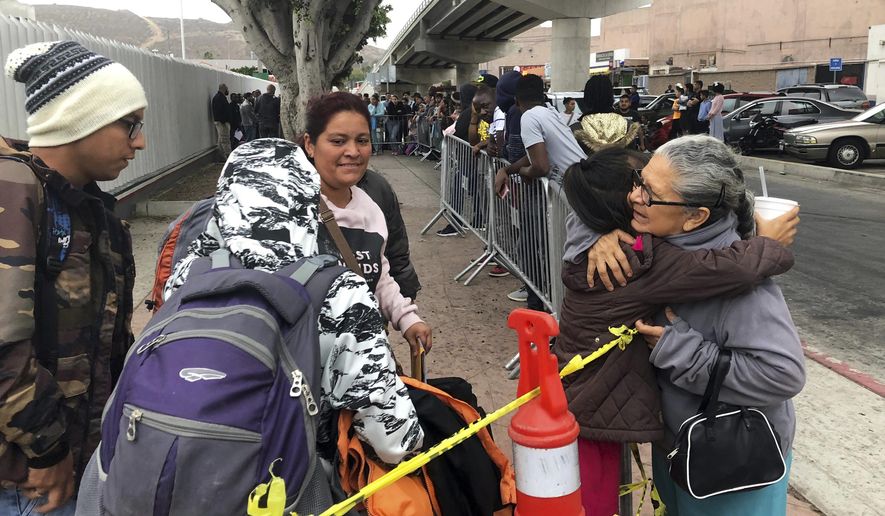TIJUANA, Mexico (AP) - Julio Lopez and his family faced a decision when they reached the U.S. border to seek asylum: cross illegally or follow government instructions to stay in Mexico, even if it meant waiting for months.
The Salvadoran family waited for their chance to make their case, only to find out the Trump administration is no longer allowing in migrants like them.
The government recently imposed a ban on asylum seekers who pass through another country on their way to the U.S., disqualifying most migrants from Central America, South America, Cuba and Africa.
The cutoff date is July 16. That means Lopez and his family would have escaped the restrictions had they crossed illegally when they arrived in early July. Because they waited, they will likely be turned away.
“I’m being punished for doing it the correct way,” Lopez said Thursday outside the tent he shares with his wife, two young children and sister-in-law in a migrant shelter. “It’s unjust.”
The Southern Poverty Law Center and other advocacy groups agree. They asked a judge on Thursday to prohibit the government from applying the new restrictions to anyone who appeared at an official border crossing to claim asylum before the policy was announced on July 16.
The government pulled an “immoral bait and switch” by instructing migrants to wait in Mexico for an opportunity to apply for asylum before restricting their eligibility, attorneys said in a court filing.
It is difficult to know how many people fall into that category, but the groups estimate that 26,000 people are on waiting lists in Mexican border cities to make an initial claim for U.S. asylum. The Associated Press counted 19,000 in just four cities in late July, including 10,000 in Tijuana alone.
Lopez, 42, who abandoned his business repairing mobile phones in El Salvador’s capital, never considered crossing illegally. He took a number in line that he figures is about two months from being called.
“I can go to (immigration) court with my head held high and say, ‘Sir, I have followed the laws of the United States,” he said.
The Justice Department declined to comment on the court filing, which is part of a lawsuit addressing two key practices that have left would-be asylum seekers frustrated and deflated.
One, known as “metering,” has limited the number of asylum seekers accepted each day at U.S.-Mexico border crossings since spring 2018. The administration blames capacity constraints.
The other is the policy that took effect Sept. 12 to deny asylum to anyone who reached the U.S. after traveling through another country and failing to seek asylum there.
U.S. officials have repeatedly said the right way to seek asylum is to request it at border crossings, instead of entering illegally. That has caused tens of thousands of migrants to wait in often-dangerous Mexican border cities under an opaque, haphazard system of waiting lists that vary sharply by city.
Lists are managed by Mexican immigration authorities, local or state authorities, migrant shelters or migrants themselves, depending on the city.
The filing by the Southern Poverty Law Center, Center for Constitutional Rights and American Immigration Council seeks action to “remedy the combined effect of these policies in a single stroke.”
It is part of a long-running lawsuit in federal court in San Diego on behalf of Los Angeles-based advocacy group Al Otro Lado that asserts metering denies people the right to seek asylum under U.S. and international law. The judge has yet to rule on the case.
“This is not the DMV. This is not the deli counter. There shouldn’t be numbers,” said Melissa Crow, an attorney for the Southern Poverty Law Center.
The asylum ban is the subject of another federal lawsuit in San Francisco. The Supreme Court said on Sept. 11 that the ban could take effect while the case is being argued.
U.S. authorities have insisted that they are respecting people’s rights to seek asylum.
“It’s not turning people away, it’s asking them to wait,” Kevin McAleenan, acting Homeland Security secretary, told reporters in October 2018, when he was Customs and Border Protection commissioner.
But those who don’t wait may get the chance others won’t.
Oscar, a 36-year-old Honduran man who crossed the border illegally with his 7-year-old son in Texas on May 28, was flown to San Diego. He got a court date and was returned to Mexico to wait for his hearing.
Oscar, who asked to be identified only by his first name due to fears for his family’s safety, avoided the restrictions. He said he didn’t know he should claim asylum at an official border crossing.
“If I had known, I would have taken a number because it’s the straight path, the correct way to go,” he said.




Please read our comment policy before commenting.